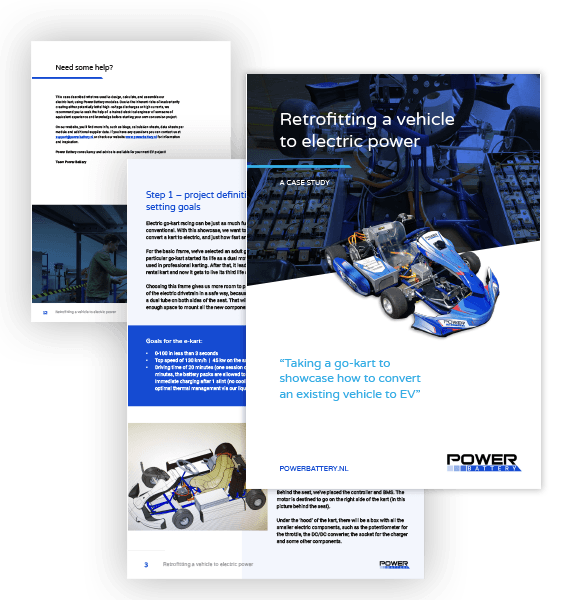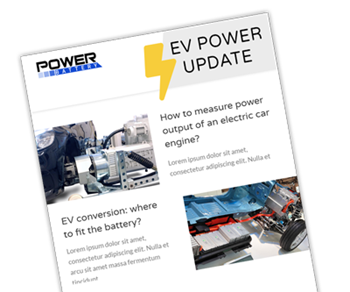How much does an electric conversion cost?
In the last decade, converting existing vehicles to electric is gaining popularity. The whole world is involved in reducing the overall emissions to save the climate. Since electric vehicles are relatively new, the range of available models is still extremely limited. This causes the rise of a whole new market, the conversion of existing petrol or diesel vehicles to electric.
Often, people have an emotional attachment to their vehicle and still want to use them in the future. Strict emission regulations for diesel vehicles prohibit the use of diesel-powered vehicles in specific areas. The most future-proof solution is to convert the car, boat, or motorbike to electric power.
Besides the positive impact on the environment, there are other advantages in converting a vehicle. The total costs of ownership are lower, for a start. The initial costs of converting a vehicle to electric are quite high, but the costs-of-ownership in the following years are much lower than for petrol or diesel-powered vehicles. This sounds very promising, but what does it take to convert a vehicle to an electric vehicle (EV)?
Before you start your EV project
The conversion of an existing vehicle to an EV is not an easy thing to do. There are a lot factors that can make it a long and frustrating process. Converting a regular vehicle to electric is usually more expensive than buying a brand-new petrol or electric vehicle. So, the first step is calculating the cost of an EV conversion.
Start by making a wish list for your conversion. Ask yourself the following questions:
- Which vehicle do you want to convert and what is the quality of this vehicle?
- What do you want to do with the vehicle?
- How much power do you want the vehicle to have? Is it the same power as the vehicle used to have or is it (a lot) more?
- How much range do you require?
- With how much power do you want to charge the vehicle?
- Where do you want to put all the electric components? Is there enough room inside the vehicle already or do you need to create more space?
The vehicle
When choosing the vehicle for your conversion, it is important to match the vehicle with your goals. When converting a classic car, ask yourself if you want to use it as a Sunday cruiser or as daily transportation? Do you want to use this car for long trips, such as on holidays? The use profile of the vehicle dictates what kind of power you want for the motor and what range you require. For a Sunday cruiser a range of 100km is more than enough, but for daily transportation you will need more. A range of at least 200 km is practically a must have, so you can visit clients and family that live further away.
If you are considering converting an older vehicle, in most cases the vehicle needs to be restored before you can convert it to electric power. If you are going to use a relatively modern vehicle or a classic vehicle that has already been restored, then you already have a good base to build on.
The cost of restoring a car, motorcycle, boat, or other vehicle to the point where it becomes a good base to convert it to an EV depends on the size of the vehicle and the condition. This is something you will need to calculate yourself.
Keep in mind that in most of the times the body of the vehicle needs to be modified to fit all the electric components.
The drivetrain
The drivetrain of an electric vehicle consists of a motor, motor controller, battery pack and charger. Once you’ve decided how much power you want and how much range you require, you can start selecting the right drivetrain components. The key words in researching all the components you need are ‘nominal voltage’ and ‘maximum voltage’.
- The nominal voltage is the operating voltage where all components work on. The nominal voltages of all the components need the be equal, otherwise your drivetrain is not efficient.
- The maximum voltage of the battery pack needs to be equal or lower than the maximum voltage of the controller, motor, and charger. Otherwise, you will destroy these components.
The most common voltages used in vehicles are 100V and 400V and some values in between. The higher the voltage, the more expensive the components get. If you are not experienced in working with electrical components, a nominal voltage of 100V is the favorite because this is relatively safe. Additionally, it is favored when using a motor with a low power output. If you are using a motor with high power output, a 400V system is advised because otherwise the current gets too high. High current requires the use of thicker HV cables, which adds weight and additional costs to your conversion.
Average pricing of an electric engine
The price of a motor is between €500,- and €12.000,-. This all depends on the power, voltage, and manufacturer. An electric motor with an operating voltage of 100V and a power output of 14kW costs around €800,-. A motor with a power output of 200kW and higher will set you back €3000,- and up.
Minimum: €500,- , maximum: €12.000,-
Motor controller
Next, is the controller. Most controllers can be bought in combination with a motor. This is recommended because the motor needs to be configured to the controller. Which you don’t want to do yourself. A good brand for motor controllers is Curtis. Those controllers are not too expensive and provide good value for money. They also sell motors, so you can also choose a controller-motor combination. The software in the controller is also very user friendly in case you want to change some settings.
The price of controllers varies a lot. The cheapest ones may cost you around €2000,- and the most expensive ones can set you back around €15.000,-.
We recommend taking the time to research all the possibilities. This could save you a lot of money.
Minimum: €2000,- , maximum: €15.000,-
Battery pack
The battery pack is the most expensive part of the EV conversion. The cost of the battery pack completely depends on the required power and range. The more power and/or range that is required, the more expensive it gets. The available space in the vehicle is also something to consider. To give you an idea how much a battery pack can cost we provide you with two calculation examples:
Battery pack cost calculation examples
|
Example 1: low power, low range |
|
|
|
|
Module: |
Endurance |
|
|
|
Nominal voltage: |
100,8V |
|
|
|
Maximum voltage: |
117,6V |
|
|
|
Continuous power: |
48,4 kW |
|
|
|
Maximum power: |
78,6 kW |
|
|
|
Charge power: |
12 kW |
|
|
|
Capacity: |
20,9 kWh |
|
|
|
Weight: |
99 kg (modules only) |
|
|
|
Volume: |
56 L (modules only) |
|
|
|
Price: |
€14.700,- (modules only) |
||
|
Example 2: high power, high range |
|
|
Module: |
Performance |
|
Nominal voltage: |
360V |
|
Maximum voltage: |
420V |
|
Continuous power: |
259,2 kW |
|
Maximum power: |
345,6 kW |
|
Charge power: |
67 kW |
|
Capacity: |
51,8 kWh |
|
Weight: |
274 kg (modules only) |
|
Volume: |
160 L (modules only) |
|
Price: |
€42.000,- (modules only) |
Charger
You need to know two things, before selecting a charger for your conversion. As before, the voltage is very important. You need to have the calculations for what the maximum and minimum voltage of the battery pack will be.
The voltage range of the battery pack needs to be inside the voltage range of the charger. Otherwise, the set-up will not work. Depending on the voltage, this will set you back between €500,- and €5000,-. The charging power prescribes how many of these chargers you will need.
Minimum: €500,- , maximum: €5000,-
Cost overview
These are the main components of an EV conversion. Anything you decide to add will make the total price higher, of course.
Total cost estimation:
|
Components |
Minimum cost |
Maximum cost |
|
Vehicle (+ modifications) |
Depends on vehicle |
Depends on vehicle |
|
Motor |
€500,- |
€5000,- |
|
Motor controller |
€2000,- |
€15.000,- |
|
Charger |
€500,- |
€1500,- |
|
Battery pack |
€14.700,- |
€42.000,- |
|
Miscellaneous |
€2000,- |
€5000,- |
|
Total: |
€19.700,- |
€68.500,- |
Notice: all prices mentioned are indications of component prices. These are no fixed values.
Custom advice for your EV project
In short, converting a vehicle to an EV can be quite a challenge and the costs highly depend on your wishlist. At Power Battery we develop, test and produce high-power battery packs and modules.
Please feel free to contact us if you have any questions regarding your project, or require a consultation.


